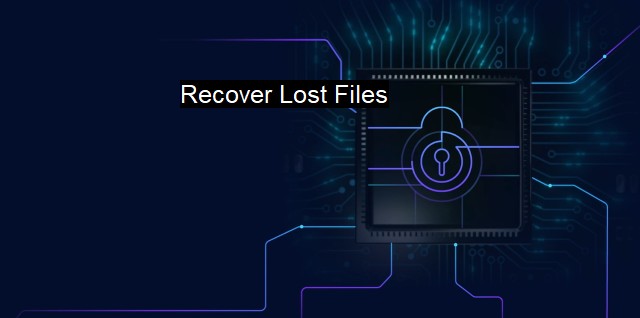What are Recover Lost Files?
Recover Lost Files: Exploring the Vital Role of Data Recovery in Cybersecurity and Antivirus Protection
"Recover Lost Files" is a critical aspect of both cybersecurity and antivirus applications. In the digital realm, protecting data is paramount, and this not only involves keeping unauthorized access at bay but also intends to recover and restore data in situations where files are lost or compromised. The term "Recover Lost Files" refers to the process of retrieving digital files that may have disappeared due to accidental deletion, corruption, formatting errors or computer viruses. Data loss, seems all too prevalent, significantly impacting both individual and corporate operations.At its core, the process to "Recover Lost Files" works on an intriguing principle. When a file is deleted, whether mistakenly or due to a virus, it is not immediately eradicated from the system. The file remains stored on the hard drive but is marked as 'free space'. Unless that 'free space' is overwritten by new data, the information is retrievable, making it possible to recover lost files.
For cybersecurity and antivirus applications, data recovery has key significance. Data is an asset, and on the web, it's frequently under threat from various cyber-attacks including phishing, DDoS attacks, ransomware, malware, and viruses. These malicious attacks not only gain unauthorized access to systems but also harm files and data. In such cases, antivirus and cybersecurity tools play a crucial role in retrieving the lost files and restoring them to their original form.
Antivirus programs often come equipped with specific features to manage threats and to consequentially recover lost files. They carry robust scanning capabilities, identifying and purging threats before they can cause harm. When a threat is detected, files may be quarantined to minimize damage. Often, antivirus software includes tools to 'rollback' changes made by malware attack, effectively retrieving and restoring files to their pre-attack state. many cybersecurity software packages provide automated data backup features to avoid permanent data loss.
Along with protection against digital threats and damage control measures, cybersecurity tools also assist in data recovery. These tools utilize various techniques like shadow copy, backup and restore, forensic recovery, file carvings, and use of live CDs to recover lost files from the system. To bolster data protection, many cybersecurity platforms incorporate data recovery as part of a layered security approach, which combines data defense with comprehensive recovery options.
The cybersecurity industry is continually evolving against the backdrop of increasing threats. In light of this, the function to recover lost files are routinely reengineered and optimized to deliver fast, accurate, and comprehensive recovery capabilities. This is incorporated into action planning scenarios, which predicate that even with the best security measures, breaches can occur leading to loss of files and data.
"Recover Lost Files" is a significant data protection strategy utilized extensively within the realms of cybersecurity and antivirus approaches. These processes help combat cyber threats and minimize their impacts, ensuring the recovery and restoration of affected files. Data loss, while problematic, need not always be definitive or destructive. The right protection measures, combined with proficient recovery capabilities, can indeed aid in successful retrieval of lost data, thus reducing the potentially catastrophic aftermath of a cyber attack. As we navigate an era where data is universally recognized as the 'new oil', the ability to recover lost files will remain fundamental in preserving digital entities in any operational scenario.

Recover Lost Files FAQs
What should I do if I accidentally delete important files?
If you have accidentally deleted important files, the first thing you should do is check your computer's recycle bin or trash folder. If your files are there, simply restore them. If not, you can try using a data recovery software. However, it is important to act quickly and avoid using your computer excessively as this can overwrite the deleted data and make it unrecoverable.Why do I need to have antivirus software on my computer?
Antivirus software is essential for protecting your computer from cyber threats, including malware, viruses, and spyware. Without antivirus software, your computer is vulnerable to these threats which can compromise your personal information, cause system failures, and even result in identity theft.Can I recover files after a virus attack?
Yes, you can recover files after a virus attack. However, it depends on the extent of the damage caused by the virus. If the virus has overwritten or corrupted your files, it may be impossible to recover them. However, if the virus has only deleted or hidden your files, then you can use data recovery software to retrieve them.How can I prevent losing files in the future?
To prevent losing files in the future, it is important to regularly back up your data. You can use an external hard drive, cloud-based storage, or a combination of both. Additionally, it's important to keep your antivirus software up-to-date and scan your computer regularly. Finally, be cautious when downloading files or clicking on links from unknown sources, as these can introduce harmful viruses onto your computer.| | A | | | B | | | C | | | D | | | E | | | F | | | G | | | H | | | I | | | J | | | K | | | L | | | M | |
| | N | | | O | | | P | | | Q | | | R | | | S | | | T | | | U | | | V | | | W | | | X | | | Y | | | Z | |
| | 1 | | | 2 | | | 3 | | | 4 | | | 7 | | | 8 | | |||||||